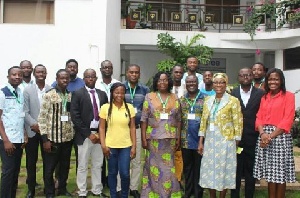African governments must invest in Geographic Information System (GIS) and be fully committed to building capacity of officials and different stakeholders in order to help detect and insulate their countries from potential natural disasters, Director of the United Nations University Institute of Natural Resources (UNU-INRA), Dr. Fatima Denton has said.
She explained that the GIS technology is a very powerful tool that is capable of processing data, its management, analysis and monitoring which if harnessed effectively can go a long way to positively impact the management of natural resources including mitigating the harmful effects of climate change.
“Some of these natural disasters are triggered by climate change while others are inclined naturally which have no link with it in terms of intensity and the frequency rate at which they are occurring.
GIS, therefore, gives us in many ways an opportunity to better understand what these natural hazards can do to infrastructure, to people, to livelihood and how we can better create some sort of buffer that enables us to insulate ourselves from these natural hazards and negative impacts that they have on our economy,” she said.
Dr. Denton made this known in an interview at the five-day intensive training workshop for professionals in resource management and research on Geographic Information Systems (GIS) and remote sensing in Accra.
The workshop was aimed at equipping participants with concepts, functional skills, methods and techniques required for prescribing location specific solutions in addressing resource management challenges facing Africa today.
According to Seyram Kofi Loh, one of the program facilitators, it was intended to bring up to speed researchers as well as resource managers in application of GIS and remote sensing technology as data capturing and decision support tools geared towards effective research work.
In all, 15 professionals from diverse backgrounds including resource management and research, science students, soil science, electrical engineering, hydrogeology as well as the media partook in the 5-day training course. The participants were taken through GIS, Remote Sensing, Global Positioning System (GPS), georeferencing and digitizing; a combination of hands-on and fieldwork (practicals) backed by theory.
At the end of the program, participants received a certificate of participation. Prior to the presentation, Dr. Denton encouraged participants to utilize the knowledge acquired to the fullest and to the benefit of themselves including the nation.
For his part, UNU-INRA’s GIS Course Coordinator, Kwabena O. Asubonteng observed that the GIS technology as a tool has a major role in shaping Ghana’s economy in diverse ways but lamented most Ghanaians who are in possession of the knowledge have failed woefully in its application to work, instead have resorted to only “administrative work”.
“The other side of the problem is that some institutions have it and over the years trying to build up solid data to be applied in such systems but have also always been a challenge and we cannot run away from the benefits of the system,” he posited.
He suggested that the best way for Ghana to harness the full potential of the GIS technology is to see government erect a national spatial infrastructure to harmonize all data and manage its institutions, for example, the Ghana Water Company Ltd., ECG, GRA and the Forestry Commission among others to easily have access to data to inform its policies.
“Elsewhere all these mini systems are integrated at a central point where security people can use but everybody has a clearance level, so you cannot run away from data,” he explained.
Professor Daniel Okae Anti, a participant and a lecturer in soil science department at the University of Cape Coast maintained that being someone who uses geostatistical tools a lot in finding the variation of soil resources such as nitrogen, phosphorus and potassium among others, discovered that GIS technology and his field of work are related hence the motivation to undergo the course.
Business News of Friday, 19 October 2018
Source: thebftonline.com

















